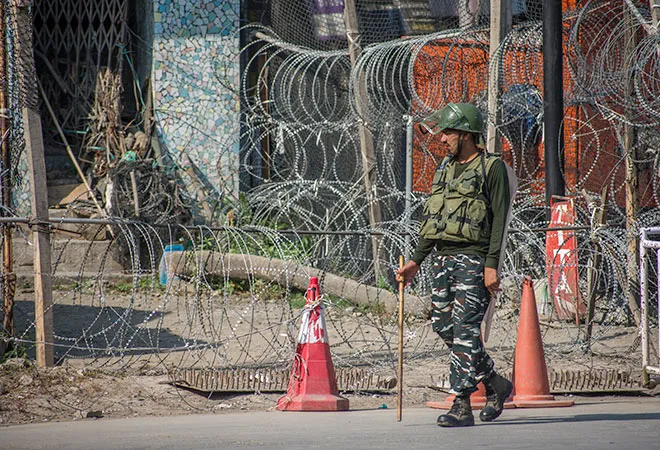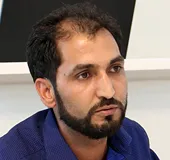-
CENTRES
Progammes & Centres
Location

Kashmiris breathed a sigh of relief on 14 October as mobile phone services, which had been silenced as part of the state-action since 5 August following the abrogation of Article 370 and Article 35A, were restored. Many Kashmiris in the rest of India and abroad, who managed to talk to their near and dear ones for the first time after a gap of 72 days would have experienced, in some sense, their lives returning to normalcy. And with euphoric newspaper reports to go by, that is largely the perception among rest of India too. But does the restoration of mobile services mean that life in Kashmir has come back to being ‘normal’?
This communication blackout started after 5 August, when New Delhi took a unilateral decision by overturning Article 370 and dividing of the state of Jammu & Kashmir into two union territories, Jammu and Kashmir, and Ladakh. In the run up to that day, the centre pushed into the Valley thousands of armed forces and other security personnel. The whole Valley came to resemble a military camp. Restrictions were armour-plated all over. Virtually overnight, hundreds of new bunkers, manned by heavily armed security personnel, were erected at every turn and junction all over the Valley. As a mark of protest against the abrogation of Article 370, Kashmiris imposed a nonviolent civil curfew in rural and urban areas. Thus, while mobiles have come back to life, life itself remains eerily subdued. The voluntary, self-imposed civil curfew is still in place and is observed by just about every disenchanted Kashmiri. Most shops remain closed from 9:00 AM to 6:00 PM. Public transport is still unavailable. Schools have reopened but classrooms remain empty. Markets that open occasionally shut without doing much business as hardly anyone comes out to make purchases. Hundreds of innocent youth who were detained under PSA are still behind bars – some of them in jails outside Jammu & Kashmir. Such an unprecedented status quo may also turn into an irreparable state of despondency and push the local population into further alienation – especially the youth, who feel cheated and helpless. The annulment of Article 370 and the repeal of Jammu & Kashmir’s separate constitution enjoyed for the last 70 years, have severely impacted the socio-psychological behaviour of society at large, strengthening the centrifugal tendencies. To avoid the uneasy calm in the Valley from erupting into widespread violence, the centre must follow up the restoration of mobile networks by urgently starting a meaningful interlocution process to restore the basic civil liberties that the people have been robbed of for the past 72 days.
Hundreds of innocent youth who were detained under PSA are still behind bars – some of them in jails outside Jammu & Kashmir. Such an unprecedented status quo may also turn into an irreparable state of despondency and push the local population into further alienation – especially the youth, who feel cheated and helpless.
If the amputation of Article 370 makes laws of the Union of India automatically applicable in Jammu-Kashmir, it also makes the erstwhile laws of state ultra-virus. The provinces of Jammu & Kashmir are now a Union Territory under the control of the Centre, and nothing is left of the constitution of Kashmir. The NDA government is therefore under an obligation to rethink what transpired over the last 70 years that escalated the “Conflict over Kashmir” and also paved the way for the “Conflict in Kashmir” with slow and steady destruction of human capital as well as economic resources.
It is now the duty of the government of India to restore the confidence of the people of Kashmir, especially the disgruntled youth, in the democratic institutions of India and the freedoms and civil liberties enjoyed by the people in any other state or Union Territory. The first step towards confidence building should be the revocation of Jammu & Kashmir Public Safety Act (PSA), which, since 1987, has become the main cause for the rise of strong centrifugal tendencies and resistance, leading to widespread and violent insurgency and militancy.
PSA – an outcome of corrupt governance and autocratic rule of Sheikh Abdullah’s National Conference (NC) – has already been slammed as a “lawless law” by Amnesty International. It was also labelled by late Ram Jethmalani, former Kashmir Committee chief and former Union Law Minister, as “something we haven't heard of even in Nazi Germany”. The PSA was enacted by Sheikh in 1978 under the excuse of curbing timber smuggling. However, it was increasingly abused as a tool to crush democratic voices of disgruntled youth against the corruption, nepotism, undemocratic rule and inconsistent behaviour of Sheikh Abdullah. Under the PSA, a person can be detained for a maximum of two years without any trial. While some of the provisions of the PSA were diluted post an amendment in 2012, it continues to remain one of the most autocratic and exploitative legislations. The law severely curtails the protection of personal life and liberty guaranteed under Article 21 of the Constitution of India. It has no place in any region that is now under the direct governance and rule of the government of India.
History affirms that the first generation of militants were those who were imprisoned under this draconian law. During the 1987 elections, the administrative machinery resorted to strong-arm tactics to beat, maim and imprison the Muslim United Front (MUF) candidates and their polling agents under the PSA on the behest of the NC and Congress. Most of them, who were released after the elections, became fodder for Pakistan’s evil designs to foment trouble in the Valley. They were trained by Pakistan to start insurgency in 1989. The ensuing violence and disturbance led to the imposition of the Governor’s Rule in January 1990. New Delhi was forced to invoke the Disturbed Areas Act, paving way for the implementation of Armed Forces Special Powers Act (AFSPA). Thus, the imposition of PSA, a state law, created a situation where the enforcement of AFSPA by the Centre became inevitable.
New Delhi was forced to invoke the Disturbed Areas Act, paving way for the implementation of Armed Forces Special Powers Act (AFSPA). Thus, the imposition of PSA, a state law, created a situation where the enforcement of AFSPA by the Centre became inevitable.
Iron-clad implementation of the PSA for three decades has not only increased anti-India sentiments, but cemented the centrifugal tendencies among the youth. Misuse of the PSA has resulted in large-scale human rights violations in Kashmir. It has led to severe estrangement and curtailment of civil liberties for Kashmiris, which are otherwise enjoyed as fundamental rights by the masses in other parts of India. The PSA also created a strong perception among the Kashmiris that they are second class citizens, as the law was never sent to Judicial review by the Supreme Court. Most of the home-grown militancy in the aftermath of the post-Burhan Wani encounter killing in 2016 was also spurred as a direct impact of the abusive enforcement of the PSA, as well as New Delhi’s institutional failure to ensure the smooth working of all democratic structures in the state. When one digs deep into the life of recent militant leaders and militants, most of them are found to have been arrested under the PSA and became victims of the extra-judicial powers vested in the local police.
Until 5 August 2019, the state government was not accountable to New Delhi for its serious omissions, frauds and draconian laws because of Article 370. Now, with Kashmir becoming an integral part of the Union of India in a true sense, New Delhi must start a meaningful and clever interlocution to restore the civil liberties and revoke PSA to create a sense of oneness. Unless the yawning gap between the local government and those governed is not bridged with such confidence building measures, the unilateral abrogation of Article 370 will remain a meaningless and futile exercise.
To win over the confidence of the Kashmiris, the Centre will have to first stop satisfying the whims of the fringe elements and the state’s political class for myopic electoral gains. The leadership must re-examine the decades-old policy of deception. However, any hasty move will backfire. Without a convincing perception management exercise, the annulment of Article 370 will merely remain an exercise limited to the integration of the region’s landmass with India; integration of hearts and larger geostrategic and geopolitical security of the nation will always remain elusive. At worst, it may give rise to a new and deadlier wave of resentment, radicalisation and violence. Only convincing perception management can sound the death knell of the “Conflict in Kashmir” and eventually make the “Conflict over Kashmir” extraneous. Repealing PSA would be a step in the right direction.
The views expressed above belong to the author(s). ORF research and analyses now available on Telegram! Click here to access our curated content — blogs, longforms and interviews.

Ayjaz Wani (Phd) is a Fellow in the Strategic Studies Programme at ORF. Based out of Mumbai, he tracks China’s relations with Central Asia, Pakistan and ...
Read More +